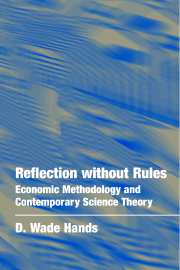Book contents
- Frontmatter
- Contents
- Preface
- 1 Introduction
- 2 The Methodological Tradition in Economics
- 3 The Breakdown of the Received View within the Philosophy of Science
- 4 The Naturalistic Turn
- 5 The Sociological Turn
- 6 Pragmatism, Discourse, and Situatedness
- 7 Recent Developments in Economic Methodology
- 8 The Economic Turn
- 9 Conclusion
- References
- Web Sites
- Index
6 - Pragmatism, Discourse, and Situatedness
Published online by Cambridge University Press: 08 January 2010
- Frontmatter
- Contents
- Preface
- 1 Introduction
- 2 The Methodological Tradition in Economics
- 3 The Breakdown of the Received View within the Philosophy of Science
- 4 The Naturalistic Turn
- 5 The Sociological Turn
- 6 Pragmatism, Discourse, and Situatedness
- 7 Recent Developments in Economic Methodology
- 8 The Economic Turn
- 9 Conclusion
- References
- Web Sites
- Index
Summary
Philosophers, after all, are like everyone else; they want people who don't do what they do to believe that what they do is universally enabling. They want us to believe that the only good king is a philosopher king, and that the only good judge is a philosopher judge, and the only good baseball player is a philosopher baseball player. Well, I don't know about you, but I hope that my kings, if I should ever have any, are good at being kings, and that my judges are good at being judges, and that the players on my team throw strikes and keep 'em off the bases.
[Fish 1987, p. 1800]Compared with other schools of economics the neoclassicals are notably butch. They are a motorcycle gang among economists, strutting about the camp with clattering matrices and rigorously fixed points, sheathed in leather, repelling affection. They are not going to like being told that they should be more feminine.
[McCloskey 1993, p. 76]The last three chapters have focused on various contemporary developments within the philosophy of science and science studies. Although these two areas constitute much of contemporary science theory, they do not exhaust it, and more important, they do not exhaust the work that is relevant to the changing face of economic methodology. For one thing, despite the impact of logical positivism, not all philosophy is philosophy of science, and more general developments within disciplinary philosophy also impact debates about scientific and economic knowledge.
- Type
- Chapter
- Information
- Reflection without RulesEconomic Methodology and Contemporary Science Theory, pp. 213 - 273Publisher: Cambridge University PressPrint publication year: 2001



